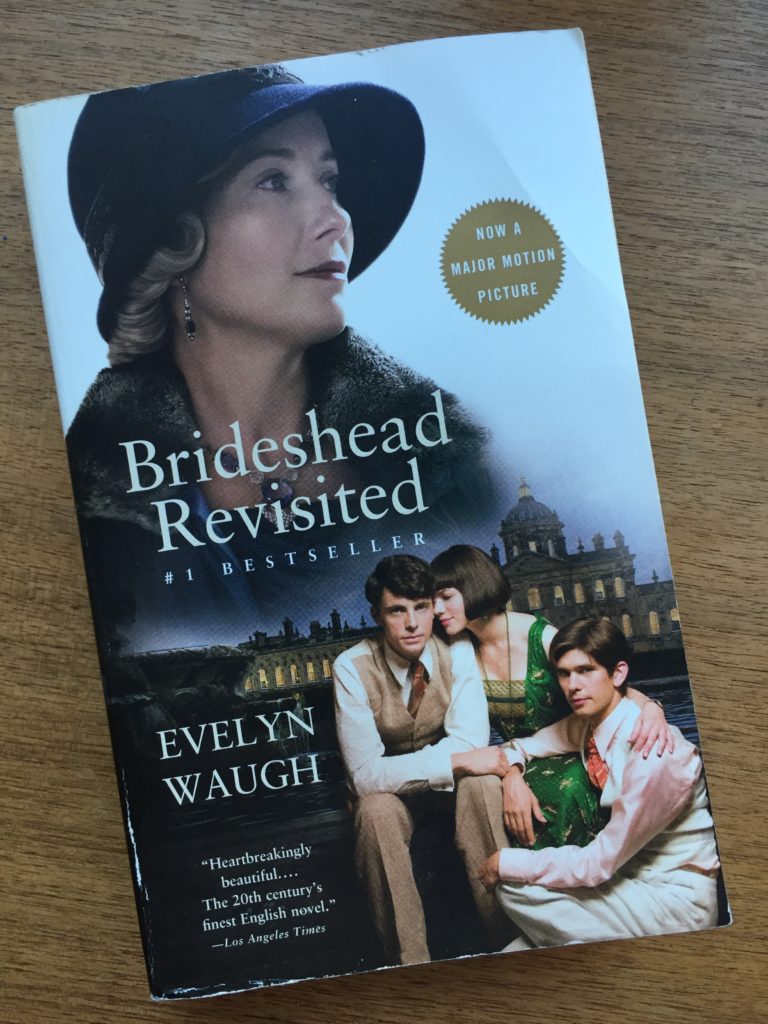 One of my reading objectives this year is to “fill in the gaps.” Which great books have I missed? Which renowned authors have escaped me? One of the books that meets this criteria is Brideshead Revisited by Evelyn Waugh.
One of my reading objectives this year is to “fill in the gaps.” Which great books have I missed? Which renowned authors have escaped me? One of the books that meets this criteria is Brideshead Revisited by Evelyn Waugh.
I had wanted to read this book for two reasons: 1) a friend who has excellent taste in literature gave it five stars on Goodreads, which I saw as high praise, and 2) I hadn’t read anything by Waugh before. Plus, I found a copy at a used bookstore for $1!
Published in 1945, the book’s complete title is Brideshead Revisited, The Sacred & Profane Memories of Captain Charles Ryder. This sets up with the plot right away: the book follows Charles Ryder, an army captain, as he looks back at a period of his life that was marked by his relationship with the Flyte family, the owners and residents of Brideshead, an estate in England.
This novel has received many accolades in the more than 70 years since it was released, including inclusion in a number of literature roundups, such as the “12 Essential English Novels Everyone Should Read” and the “100 Best Novels.”
Brideshead Revisited follows Charles Ryder from the 1920s, when he is a student at Oxford, through to the 1940s, when he serves in the British Army during World War II. The novel explores the waning days of the British aristocracy, at a fragile point in time in the early twentieth century. While at Oxford, Charles falls in with Sebastian Flyte, the younger son of the Marquess of Marchmain, the head of the Flyte family. Sebastian is everything Charles is not—carefree, (seemingly) unencumbered, and a member of a large and demanding family—and Charles—an only child who is not as wealthy or glamorous—finds himself becoming close with Sebastian, and, by extension, the Flyte family.
The Flyte family is Catholic, and their faith, seen through Charles’ agnostic eyes, is complicated. Each member of the family struggles with their Catholicism, and this causes uncertainty in Charles’ relationships with them, specifically with Julia, with whom he falls in love. Other themes explored in this book include alcoholism (a problem that consumes Sebastian), art (Charles becomes a successful painter after his time at Oxford), and homosexuality (are Charles and Sebastian in love, or are they close friends? It is up to the reader to decide). It’s also, in my view, a commentary on marriage, as Waugh profiles several unhappy such relationships in the novel.
What makes this book great is Waugh’s way of capturing a time and place, long gone. As John K. Hutchens wrote in his 1945 New York Times review of the book, “Brideshead Revisited has the depth and weight that are found in a writer working in his prime, in the full powers of an eager, good mind and a skilled hand, retaining the best of what he has already learned. It tells an absorbing story in imaginative terms. By indirection it summarizes and comments upon a time and a society. It has an almost romantic sense of wonder, together with the provocative, personal point of view of a writer who sees life realistically.”
The book’s nostalgia and romantic view of youth also are derived from its structure. As Charles looks back upon his time intertwined with the Flytes, he remembers the way we all recall the past—part hopeful, part chagrined, part uncertain.
This was not a book that consumed me; rather, it drew me very slowly, in a sly way, until I was fully engrossed. That, perhaps, is one of Waugh’s talents. As Hutchens wrote in his review, “For Mr. Waugh is very definitely an artist, with something like a genius for precision and clarity not surpassed by any novelist writing in English in his time.”
Rating: 4/5 stars
Recommendation: A must-read for English literature fans, or for those seeking a glimpse into England of the 1920s-1940s. Excellent writing and insightful observations.
FYI: Brideshead Revisited has been adapted for the screen, most recently in 2008, starring Emma Thompson. You can catch in on Netflix.

Brideshead Revisited is one of my most favorite books! I first read it in high school and have reread it many times. I still have my original copy – the cover is crumbling, the spine is weak and it easily falls open to some of my favorite pages, and when I pick it up and open its page I feel the pleasure of anticipating a visit with a dear old friend.